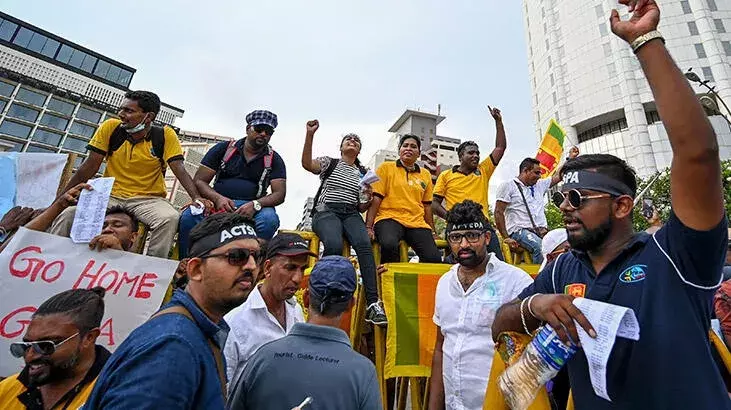
Trade unions started their “Week of Protests’’ yesterday, demanding Sri Lanka’s government change and its president step down over the country’s worst economic crisis in memory.
The Indian Ocean island nation is on the brink of bankruptcy and has suspended payments on its foreign loans. Its economic woes have brought on a political crisis, with the government facing widespread protests and a no-confidence motion in Parliament.
Unions called for protests throughout this week, trade union activist Saman Rathnapriya said, and more than 1,000 unions representing health, port, education, and other key service sectors have joined the ``Week of Protests” movement.
He said during the week, the workers will stage demonstrations at their workplaces across the country. At the end of the week, they will launch a huge march up to Parliament, demanding President Gotabaya Rajapaksa’s removal and a new government.
For several months, Sri Lankans have endured long lines to buy fuel, cooking gas, food and medicine, most of which come from abroad. Shortages of hard currency have also hindered imports of raw materials for manufacturing and worsened inflation, which surged to 18.7 percent in March.
People blocked main roads to demand gas and fuel.
Sri Lanka was due to pay $7 billion of its foreign debt this year out of nearly $25 billion it must pay by 2026. Its total foreign debt is $51 billion.
Sri Lanka’s finance minister announced earlier this week that the country’s usable foreign reserves have plummeted below $50 million.
As oil prices soar during the Russia-Ukraine conflict, Sri Lanka’s fuel stocks are running out. Authorities have announced countrywide power cuts will increase to about four a day because they can’t supply enough fuel to power generating stations.
Protesters demanding Rajapaksa’s resignation reached the 31st day occupying the entrance to the president’s office.